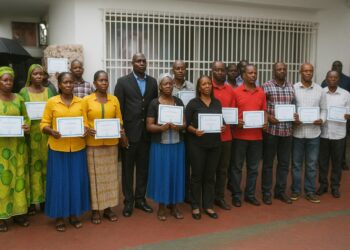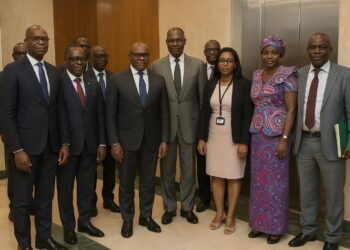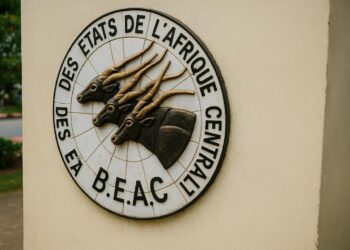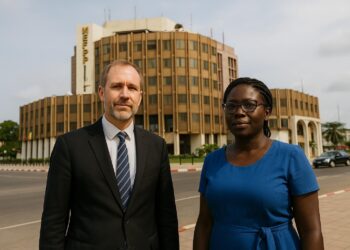Protocol agreement seals 2026 AfDB Meetings
On 19 September, Brazzaville became the confirmed venue for the African Development Bank’s 2026 Annual Meetings after the institution and the Republic of Congo signed a comprehensive protocol agreement. The announcement positions the Congolese capital at the heart of continental financial diplomacy for five decisive days in May 2026.
The memorandum was endorsed by Vincent Nmehielle, Secretary-General of the AfDB Group, alongside Economy Minister Ludovic Ngatsé, and witnessed by Prime Minister Anatole Collinet Makosso and several cabinet colleagues. Their signatures give legal force to months of informal contacts between Abidjan headquarters and Brazzaville’s inter-ministerial task-force.
Legal and organisational framework
Under the accord, the 61st AfDB Assembly and the 52nd African Development Fund Assembly will run from 25 to 29 May 2026, attracting governors, finance ministers, senior economists and development partners from the Bank’s 54 regional and 27 non-regional member countries.
The document outlines the responsibilities of each party, from protocol services and customs exemptions to security, medical coverage, information technology and event branding. It also sets the financial parameters that will allow Congolese and Bank teams to coordinate procurement under AfDB’s established fiduciary guidelines.
Preparatory mission insights
Signing the protocol capped a first reconnaissance mission led by AfDB experts between 11 and 19 September. The delegation inspected congress facilities, hotels, transport corridors and emergency services, compiling a confidential aide-memoire that now guides the government’s investment matrix for the next thirty months.
“We now have a clearer picture of mutual obligations and timelines,” Minister Ngatsé explained, stressing that early clarity will prevent cost overruns. For him, hosting the Meetings presents “an accelerator for structural reforms already endorsed in the National Development Plan”.
Secretary-General Nmehielle welcomed the spirit of partnership, noting that Congo’s pledge to deliver venues, utilities and logistics “in line with Bank standards” will underpin a safe, inclusive and results-oriented gathering. He added that the AfDB stands ready to deploy additional technical missions as milestones are reached.
Economic and diplomatic significance
An aide-memoire attached to the protocol lists priority works such as modernising fibre links, expanding Brazzaville’s Maya-Maya International Airport arrival halls and streamlining visa facilitation. While confidential, officials say the document provides sequenced benchmarks that will be reviewed quarterly by a joint steering committee.
Beyond logistics, the Meetings carry symbolic weight. They will be the first AfDB Assemblies held in Congo, underscoring President Denis Sassou Nguesso’s ambition to position the country as a reliable convenor of high-level multilateral dialogue in Central Africa.
Economic dividends are expected to ripple through hospitality, transport, telecoms and professional services as thousands of delegates, media representatives and private-sector observers converge on the capital. Local chambers anticipate a temporary rise in demand for conference equipment, translation services and high-speed data capacity.
Infrastructure and private-sector openings
Equally important is the chance to showcase ongoing infrastructure upgrades financed under the National Development Plan and supported by AfDB sovereign loans. Visibility during site visits could strengthen investor confidence in roads, energy supply and digital backbone projects already underway across Brazzaville and surrounding economic corridors.
The private sector will have room to feed into official conversations through side events traditionally organised by the Bank’s Private Sector Department. Congolese SMEs in agribusiness, wood processing and fintech may leverage exhibition spaces to pitch bankable projects aligned with the institution’s High-5 strategic priorities.
Climate and sustainability spotlight
Diplomatically, the Meetings offer a platform to deepen engagement with development partners such as the European Union, China and the Gulf, all active co-financiers of AfDB operations. Brazzaville’s ability to host inclusive round-tables could reinforce its soft-power credentials within regional economic communities.
Climate considerations will also permeate the agenda, given the AfDB’s focus on adaptation finance and Congo’s stewardship of ten percent of the Congo Basin rainforest. Authorities intend to highlight domestic reforestation programmes and emerging carbon-credit frameworks during planned thematic sessions.
Governance timeline and investor watchpoints
Operationally, a national organising committee chaired by the Prime Minister is expected to be formalised before year-end, cascading tasks to sectoral sub-committees on venues, security, protocol and communications. Early budgetary allocations will be integrated into the 2024 and 2025 finance laws to secure timely disbursements.
From an investor standpoint, the countdown to May 2026 represents a predictable timeline for hospitality refurbishments, digital upgrades and public-private partnerships that could outlive the event. Monitoring the quarterly steering-committee communiqués will help firms calibrate bids and resource mobilisation strategies.
With the agreement now signed, Brazzaville enters a pivotal execution phase. Effective coordination, transparent procurement and continuous dialogue with the AfDB will determine whether the Meetings become both a diplomatic milestone and a practical catalyst for Congo’s medium-term diversification agenda.
International observers will watch cost management closely, yet precedent shows that well-planned host countries often capture intangible gains through reputation and network effects. Brazzaville’s leadership appears keen to convert that goodwill into sustained deal flow across energy, logistics and digital sectors after the delegates depart.











































